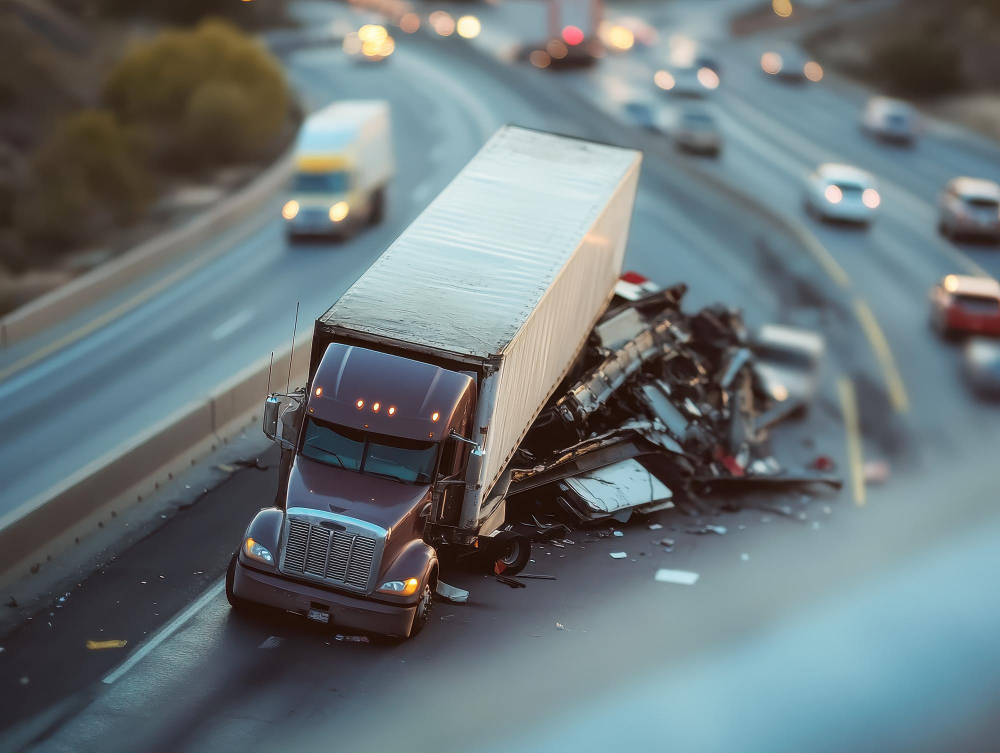Federal vs. State Law in 18-Wheeler Accident Liability
In 2022, Texas experienced 38,621 18-wheeler accidents, resulting in 612 fatalities and 160,000 injuries. 97% of those killed were smaller vehicle occupants. Liability is influenced by federal and state laws, which consider federal standards and state-specific regulations, ensuring that trucking companies’ responsibilities and drivers’ negligence are considered.
Understanding truck accident laws can be challenging. Getting how federal rules and state laws work together is super important when dealing with truck accidents in Texas. These cases become complex due to the numerous rules and regulations governing the trucking industry. Hiring a truck accident lawyer from Mokaram Law Firm ensures that your case is vigorously fought for, aiming for 100% results.
In this post, we’re going to explain the key parts of both federal and state laws. We want to make sure you understand how each one affects your claim for the accident.
Let’s dive into the complexities of these legal systems and how they affect your rights.
The Role of Federal Regulations in Trucking Accidents

Federal regulations are crucial for keeping 18-wheeler operations safe and accountable throughout the U.S. The Federal Motor Carrier Safety Administration (FMCSA) from the U.S. Department of Transportation sets these rules to maintain a consistent standard for trucking companies and drivers. These rules are designed to lower the risk of accidents caused by carelessness, poor vehicle upkeep, or driver mistakes.
Main Points of FMCSA Rules
- Driver Requirements: Truck drivers must pass medical exams, have a valid CDL, and pass drug and alcohol tests. They also need special training for handling dangerous materials or large loads.
- Hours of Work: The Hours of Service rule limits how long drivers can work each day or week to avoid accidents from fatigue. For instance, drivers can only work 11 hours in a 14-hour shift and must take a 30-minute break after eight hours.
- Vehicle Maintenance: The FMCSA requires regular checks, repairs, and maintenance of 18-wheelers to keep them safe on the road. This includes inspecting brakes, tires, lights, and how cargo is secured, with trucking companies keeping records of these inspections.
- Safety Standards: The rules cover various safety topics like weight limits for trucks, handling of dangerous materials, and keeping accurate driving records. These measures help prevent accidents from overloading trucks, improperly securing cargo, or missing records.
- Electronic Logging Devices (ELDs): The FMCSA has made it mandatory for trucks to use ELDs to accurately record drivers’ work hours. This helps prevent record falsification and ensures drivers follow their work hour limits, which improves road safety.
By following these standards, the goal is to reduce 18-wheeler accidents. Not following these rules can lead to big fines and liability in accident lawsuits, especially if the violation caused the crash.
How State Laws Govern Personal Injury Claims
While federal regulations establish the minimum standards for trucking operations, state laws determine the specifics of personal injury claims associated with 18-wheeler accidents. Each state has its unique set of laws governing the filing of claims, which include the statute of limitations, negligence standards, and damage caps. Additionally, these laws determine the process for assigning fault and the types of compensation victims are entitled to.
The Intersection of Federal Regulations Vs. State Laws
In cases involving 18-wheeler accidents, federal regulations play a crucial role in determining liability, particularly when violations by the FMCSA are found to have contributed to the incident. Concurrently, state laws steer the legal proceedings for seeking compensation. Victims of 18-wheeler accidents must navigate through both federal and state legal systems, often with the help of a seasoned attorney, to secure just compensation.
What are the penalties for CDL violations?
The penalties for CDL violations can vary based on the nature and severity of the offense. Here’s an overview of potential penalties you may face:
- Disqualification of License: Serious violations can lead to disqualification of your commercial driver’s license. This can last for a few months to several years, depending on the offense.
- Points on Driving Record: CDL violations can add points to your driving record. Accumulating too many points may result in suspension of your CDL.
- Fines and Fees: Many violations carry hefty fines. These can vary greatly based on the severity of the violation and local laws.
- Increased Insurance Rates: A violation can lead to higher insurance premiums. This can impact both personal and commercial insurance costs.
Understanding these penalties is crucial for maintaining a valid CDL and ensuring road safety.
Texas Trucking Laws & Regulations
In Texas, trucking is tightly regulated to keep roads safe and prevent accidents. Trucks have weight limits of up to 80,000 pounds to protect roads and ensure safe driving. Trucking companies must have a lot of insurance, from $750,000 for general freight to $5,000,000 for hazardous materials.
Truck drivers need a Commercial Driver’s License (CDL) after passing tests to show they can drive big trucks safely. Texas also limits how long drivers can work, requiring breaks to avoid accidents caused by being too tired. Drivers must use Electronic Logging Devices to track their hours and follow these rules.
The Texas Department of Motor Vehicles (TxDMV) makes sure trucks are inspected regularly and follow strict rules. Texas also requires truck drivers and companies to have more insurance than regular car drivers, because big trucks are more dangerous.
How Can Violations of Trucking Regulations Impact My Texas Truck Accident Case?
Many truck accidents happen because of careless actions. To get money for damages in a truck accident case, you need proof that the other party was careless and caused the crash.
Breaking truck safety rules can also cause an accident.
Here are some common ways carelessness and breaking truck rules can lead to an accident:
- Not paying attention while driving
- Being too stressed or tired
- Loading cargo wrong
- Not keeping the truck in good condition
- Changing driving log records to break rules about how long drivers can work
- Not checking drivers’ backgrounds
- Letting drivers keep driving with traffic violations or failed drug/alcohol tests
- Trucking companies can be responsible for the careless actions of their drivers. Our lawyers in Houston will fight hard to get money from all responsible parties for all your damages.
Demand Justice Now – Call Mokaram Law Firm and Win Your 18-Wheeler Case!
Mokaram Law Firm doesn’t just handle 18-wheeler accident cases — we dominate them. We’re here to take on reckless truck drivers, negligent companies, and anyone standing in the way of getting you the compensation you deserve. If you’ve been in an 18-wheeler accident, we won’t stop until we make them pay. No excuses, no delays — just aggressive, hard-hitting legal action to get you results. At Mokaram, we don’t settle for less. We’re here to win, and we won’t rest until you do.
FAQs
Who is liable for a truck accident in Texas?
Liability in a truck accident can fall on several parties, including the truck driver, the trucking company, vehicle manufacturers, or even other drivers. Factors like negligence, violation of regulations, and the specifics of the accident play a crucial role in determining liability.
How long does it take to litigate a truck accident case?
The timeline for litigating a truck accident case can vary significantly, typically ranging from several months to a few years. Factors affecting this duration include the complexity of the case, the willingness of parties to negotiate, and the court’s schedule.
How much are most truck accident settlements?
Settlement amounts for truck accident cases can vary widely based on factors such as the severity of injuries, economic damages, and the degree of negligence involved. On average, settlements can range from tens of thousands to several million dollars, depending on the specifics of each case.
Recent Posts
-
 30 Jan 2025Washington, D.C. Plane Crash: Investigation Underway Following Collision with Black Hawk Helicopter
30 Jan 2025Washington, D.C. Plane Crash: Investigation Underway Following Collision with Black Hawk Helicopter -
 22 Jan 2025How Do People Who Text and Drive Get Punished in Different States?
22 Jan 2025How Do People Who Text and Drive Get Punished in Different States? -
 22 Jan 2025Do Pedestrians Have the Right of Way?
22 Jan 2025Do Pedestrians Have the Right of Way? -
 20 Jan 2025Are Radar Detectors Legal? Everything You Need to Know About Radar Detector Laws
20 Jan 2025Are Radar Detectors Legal? Everything You Need to Know About Radar Detector Laws -
 20 Jan 2025What Age Can You Get Your Driver's License in Texas?
20 Jan 2025What Age Can You Get Your Driver's License in Texas? -
 07 Jan 2025Legal Help for Families Affected by Jeju Air Flight 2216
07 Jan 2025Legal Help for Families Affected by Jeju Air Flight 2216 -
 17 Dec 2024Is Lane Splitting Legal in Texas?
17 Dec 2024Is Lane Splitting Legal in Texas? -
 17 Dec 2024Can Police Write Tickets in a Car Accident? | Legal Insights
17 Dec 2024Can Police Write Tickets in a Car Accident? | Legal Insights -
 01 Dec 2024What is the Minimum Age to Get a Tattoo in the USA?
01 Dec 2024What is the Minimum Age to Get a Tattoo in the USA? -
 29 Nov 2024Is It Really Illegal to Drive Barefoot? Debunking Common Myths
29 Nov 2024Is It Really Illegal to Drive Barefoot? Debunking Common Myths -
 29 Nov 2024Is It Illegal to Get Someone Drunk?
29 Nov 2024Is It Illegal to Get Someone Drunk? -
 29 Nov 2024Is it Illegal to Drive With Headphones? Understanding the Risks and Laws
29 Nov 2024Is it Illegal to Drive With Headphones? Understanding the Risks and Laws
